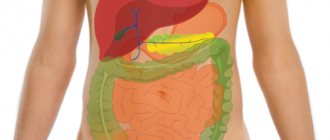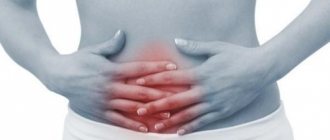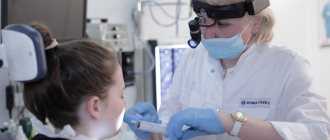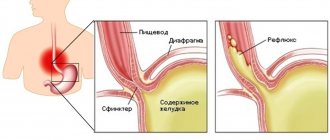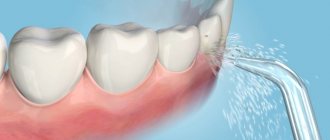The appearance of an unpleasant odor from the mouth, medically called “halitosis,” is a signal of trouble in the growing organism. Kaliningrad residents can notice this symptom when communicating with a child, laughing or kissing.
In most cases, odor occurs due to poor hygiene, which disrupts the balance of microflora in the mouth and increases the number of pathogenic microorganisms. During the decomposition of bacteria, compounds of hydrogen sulfide and nitrogen are formed, which are exhaled along with the air.
In this situation, the problem can be solved with the help of hygiene and does not pose any danger to the child’s health. However, there may be other reasons for the appearance of a specific odor from the mouth. In what cases should parents be wary - we will find out further...
Risk factors affecting fresh breath
Let's start by identifying the reasons that negatively affect healthy breathing. At the same time, we note that microflora imbalance can occur even in healthy children. This happens for a number of reasons:
- failure to comply with hygiene rules, as we have already outlined;
- dry mouth due to insufficient saliva;
- insufficient water and fluid intake;
- breathing through the mouth, out of habit or due to nasal congestion;
- oral infections (untreated caries, gum disease, etc.);
- consumption of foods with a pungent odor (garlic, onions) or those that provoke fermentation (legumes, grapes);
- taking medications;
- hormonal imbalance;
- smoking (relevant for teenagers).
Thus, in most cases, the cause of bad breath is problems in the oral cavity, infections and poor diet.
Intestinal infections
In a newborn, diarrhea is a sign of dysbiosis
Intestinal infections are caused by an imbalance of opportunistic flora and damage by pathogenic bacteria. Diseases of this kind are contact diseases. Therefore, parents need to comply with all hygiene standards for themselves and their baby.
Signs of intestinal infection:
- loose, frequent stools;
- the presence of a large amount of mucus in the stool, pieces of undigested food, and in severe cases - blood;
- abdominal pain - the baby screams and pulls his legs towards his tummy;
- anxiety;
- there may be a refusal to eat, the baby does not want to breastfeed;
- increased body temperature;
- general weakness, lack of activity;
- vomit;
- drowsiness.
If such symptoms appear, the child should be immediately shown to a pediatrician. You may need to be hospitalized in the infectious diseases department of the hospital and take hydration measures.
How to distinguish a normal smell from a problematic one?
If an unpleasant symptom occurs exclusively in the morning and goes away after brushing your teeth, then we are talking about a physiological norm. If bad breath is observed after hygiene procedures and becomes protracted, then this deviation requires the closest attention from parents.
In addition, it is worth noting that the above risk factors can be eliminated. However, if hygiene is maintained, respiratory infections and specific foods are excluded, and the unpleasant symptom persists for a long time, this is a good reason to consult a doctor.
In this case, altered breathing can signal very specific diseases. Let's look at which ones further...
Feces and its features in children of the first month of life
A newborn with diarrhea can be calm
What constitutes the basis of a newborn baby's diet? This is breast milk or adapted formula. These foods are liquid and therefore the stool contains more water than the feces of an adult.
The nature of feces in a baby of the first year of life:
- The first and second days after birth, the stool is black, viscous and sticky. Defecation several times a day. This is meconium and such bowel movements are normal.
- The third day and before the introduction of complementary foods - the feces are yellow and soft, watery. Sometimes you come across curdled pieces in small quantities. Bowel movements occur several times a day.
If the baby uses an adapted formula, the color of the stool may have a greenish or black tint. Typically, formulas are fortified with iron to prevent anemia. This is what gives stool such an unpleasant tint. After the introduction of complementary foods and with the expansion of the diet, the color of feces gradually becomes similar to the feces of an adult. Bowel movements occur 1–2 times a day.
If your baby passes liquid stool, but is not worried, eats well, gains weight, actively plays and develops according to age standards, then there is nothing to worry about. After switching to a more adult diet, the feces will become denser and will delight the parents.
List of diseases that can be detected
Despite the fact that halitosis is not a disease, it is an important diagnostic symptom by which a specialist can assume the presence of a certain disease in the body. Suspected health problems may include:
- diseases of the nose and nasopharynx: sinusitis, pharyngitis, tonsillitis, adenoiditis;
- food allergies or respiratory rhinitis causing nasal congestion;
- dental diseases of teeth and gums;
- Gastrointestinal diseases: gastritis, increased stomach acidity, intestinal dysbiosis, etc.;
- endocrine disorders: diabetes, thyrotoxicosis, etc.
As can be seen from this impressive list of diseases, solving breathing problems can fall within the competence of a variety of highly specialized specialists: otolaryngologist, dentist, gastroenterologist, endocrinologist.
What to do if a small child has terrible breath during an acute respiratory viral infection
When seasonal viral diseases (including sore throat) occur, severe inflammation occurs in the baby’s nasopharynx. It can appear on the tonsils, throat, nose (with sinusitis), lungs, depending on the specific disease. As a result, the inflamed areas become covered with plaque and pus, which creates stale, unpleasant breath. But don’t worry, halitosis goes away as soon as the children recover. Doctors always prescribe regular rinsing with antiseptic solutions (furacilin, rotokan and others), they quickly get rid of stench.
What can a smell “tell”?
As we mentioned earlier, unhealthy breath can quite eloquently indicate a certain nature of the disease. For example:
- a sour smell indicates problems with the stomach: high acidity, reflux or dysbacteriosis;
- the smell of a rotten egg - about a stomach ulcer or a violation of bile outflow;
- putrefactive – about diseases of the esophagus and low acidity of the stomach;
- acetone – about problems with blood sugar levels (diabetes) or dehydration;
- ammonia - about kidney disease, liver dysfunction and diffuse toxic goiter;
- boiled cabbage - problems with metabolism, liver and kidney diseases.
As a rule, already at the stage of collecting anamnesis and during the clinical examination, the doctor can make an assumption about the true causes of the problem.
Psycho-emotional state disorder
Sometimes halitosis can occur in children after severe excitement.
In some cases, the cause of halitosis may be hidden in the environment that surrounds the child. The fragile psyche reacts too painfully and sensitively to stressful situations, which can be almost invisible to adults, but for a child they are a serious test.
When the nervous system is overexcited, dry mouth, acetonemic crises with all their consequences mentioned above, and digestive disorders are possible.
You need to talk to your child to try to find out the root cause of worries and fears. Maybe he has problems in the children's team (conflicts in the yard, at school or kindergarten). Older children also have more serious problems. Sometimes this syndrome can occur due to failures in studies or during exams.
Children often have problems with their home environment - they experience constant fear of possible punishment for various little things - unassembled toys, something dropped on the floor, etc. He may be afraid to once again disturb adults with a question that worries him, as he may receive an irritated answer.
Such a nervous state often results in various disturbances in the functioning of the child’s body, which can result in bad breath.
If your baby is very worried, give him a slightly acidified drink and calm him down by any available means. Once the environment is normalized and stress is relieved, halitosis should disappear.
Diagnosis and treatment
To diagnose ENT diseases, an otolaryngologist uses hardware and laboratory tests. These include:
- rhinoscopy – to examine the nasal cavity;
- radiography and computed tomography - to assess the condition of the sinuses;
- examination of nasal secretions to determine the causative agent of inflammation;
- Blood and urine tests will complement the clinical picture.
In the process of collecting anamnesis, the doctor is interested in the following questions:
- How long has the child been complaining of discomfort?
- What time of day does the smell appear and how long does it last?
- What foods did the child eat?
- how much water does he drink?
- Does the smell go away after brushing your teeth?
- What chronic diseases does he have?
- what medications does he take?
Treatment does not imply the elimination of the symptom itself, as such, but the therapy of the specific disease that provoked its appearance. If, as a result of examination and diagnostic measures, pathologies of the nose or nasopharynx were identified, the doctor will prescribe adequate drug treatment, which may include:
- antibacterial therapy (taking antibiotics);
- vasoconstrictors and antihistamines;
- special medical procedures;
- physiotherapy: inhalations, UV and UHF therapy;
If necessary, the otolaryngologist can refer a small patient to specialized specialists if the solution to this problem falls within their competence (dentist, gastroenterologist, etc.).
Surgical pathologies
Inflammation of the appendix is difficult to diagnose in a baby in the first year of life, since the baby cannot show where it hurts. The disease is dangerous because it develops at a hurricane pace. And from the onset of the inflammatory process to the rupture of the organ, only a few hours can pass.
Symptoms of the pathological process:
- anxiety;
- weakness and apathy - the baby lies and does not want to play or move;
- forced pose - the toddler turns over on his right side and assumes a fetal position;
- fever, chills, fever;
- lack of appetite with increased thirst;
- vomit;
- diarrhea is profuse and repeated.
Such symptoms require immediate hospitalization of the child in the surgical department. If diagnosis is difficult, diagnostic laparoscopy is indicated.
Preventive recommendations
In conclusion of our review, I would like to draw the attention of parents to adjusting their children's diet. Our nutritional recommendations are as follows:
- Let us remember that “bad” bacteria love a sweet environment, so it makes sense to limit the consumption of industrially produced sweets and sugar.
- As a dessert, you can offer your child natural sweets made from dried fruits and nuts, as well as fresh fruit.
- Replace carbonated drinks with pure water or herbal tea made from chamomile and mint.
- To create beneficial microflora in the intestines, a child should consume more “live” fermented milk products: cottage cheese, kefir, yoghurts.
Parents need to understand that this delicate problem requires a qualified approach, since over time it can lead not only to problems at the physiological level, but also cause social isolation of the child.
Kaliningrad residents can make an appointment with a pediatric otolaryngologist by filling out an online form on our website or by calling: +7 (4012) 357-773 or +7 (4012) 973-100.
Causes and mechanism of regurgitation
The following reasons are identified:
- Filling the stomach with air, which the child can swallow while eating. This is the most common reason, which requires practically no special correction.
- Muscular weakness of the valve between the esophagus and stomach. It develops as the child grows and begins to function normally by the first year of life. Therefore, food can pass from the stomach into the esophagus without hindrance, which is what happens during regurgitation.
- Food allergies (or food intolerances). Most often it manifests itself as skin reactions, but in rare cases, regurgitation may be a symptom.
- Congenital defects of the gastrointestinal tract. The digestive system is quite complex; some disturbances in its structure can lead to digestive problems that begin to appear immediately after birth. Thus, narrowing in the area of the gastrointestinal junction can lead to frequent atypical regurgitation.
Next, we will provide recommendations on how to distinguish pathology from the norm, and when you need to see a doctor. If regurgitation is caused by a disease, then it is reasonable to begin treatment as soon as possible.
Actions to prevent regurgitation
- hold in a column after feeding until burping;
- do not place on the stomach after eating;
- if the child is bottle-fed, then after consulting a doctor, you can choose an antirefluxor formula. It will prevent regurgitation due to its thickness;
- We do not play active games after feeding, we do not swaddle. Due to the physiological immaturity of the sphincter located between the stomach and esophagus. After food products pass through it, it may not close. Food can easily pass through the esophagus into the oral cavity. In children of the first year of life, this sphincter is poorly developed and may not work well.
